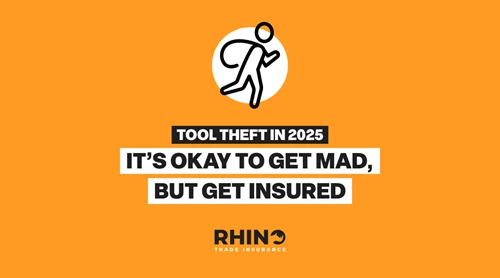While accidents can be unavoidable, there are numerous measures tradespeople can take to prevent mishaps and the ensuing claims. Today, Rhino Trade Insurance will share a range of practical tips and best practices aimed at enhancing safety, minimising accidents, and, ultimately, safeguarding both tradespeople and trade businesses!
Step 1: Prioritise Training and Education
Investing in comprehensive training for yourself and your team is the first step towards accident prevention. Ensuring everyone is well-versed in the latest safety protocols, equipment usage, and industry best practices will help see you have a smooth day on the job. Continuous education not only sharpens skills but also cultivates a safety-conscious mindset among your workforce.
Step 2: Conduct Regular Safety Audits
Safety and spotting potential dangers is the name of the game! Frequently audit your workspace or job site so that you can identify potential hazards before they escalate. Regular inspections of tools, equipment, and the working environment are essential for you, your workers, customers and the general public. Encourage your team to report any issues they encounter promptly so that small issues don't turn into major problems. Taking a proactive approach to identifying risks can easily help prevent accidents and subsequent claims against your trade business.
Step 3: Provide Adequate Personal Protective Equipment (PPE)
Whether you work alone or have a team of tradesmen and women, equip yourself and your team with high-quality personal protective gear tailored to the specific tasks your business undertakes. From hard hats and gloves to safety goggles and ear protection, the right PPE significantly reduces the risk of injuries and long-term damage. Regularly inspect and replace worn-out or damaged equipment to ensure maximum effectiveness. On top of that, providing due care for your team will see them trust you more, ultimately meaning they will want to do a better job for you. Plus, customers who see that you take care of yourself and your employees will see you in a more 'professional' light.
Step 4: Emphasise Proper Tool Usage and Maintenance
Improper tool usage is a leading cause of accidents in the trades. Ensure you and your team members are trained and stay up to date on how to handle tools correctly and use them. Be clear on the importance of regular maintenance and how old tools can break down, cause injuries or even damage a customer's property. Old or malfunctioning tools often cause accidents and injuries on trade sites, so making routine checks and replacements is an essential part of your job.
Step 5: Promote a Culture of Communication
As a trade business owner or project manager on-site, promoting open communication among team members can reap rewards. Workers should feel comfortable reporting potential hazards or unsafe practices without fear of reprisal - at the end of the day, it's your business that will suffer if you don't know what's wrong on a job. Establishing a culture of communication fosters trust and ensures that issues are addressed promptly, reducing the likelihood of accidents and claims.
Step 6: Implement a Rigorous Risk Management Plan
No matter the size of the trade jobs you work on, developing a robust risk management plan that identifies potential hazards specific to your trade is a great tool in your box. Regularly review and update this plan as your business evolves, and consider conducting a risk assessment for every job you do. Being proactive about risk assessment allows you to implement preventive measures, reducing the likelihood of accidents and claims. It also gives you some evidence of your procedures if a claim is ever made and increases the likelihood of quality and lucrative customers hiring you for work.
Step 7: Have a First Aid Kit and Emergency Plan
Accidents can still happen despite your best efforts - especially when working as a tradesman or woman. That's why being prepared for anything is your best course of action. By having a well-stocked first aid kit on-site and a clear emergency response plan in place, you ensure that *should things go pear-shaped*, there's a way to manage the situation without panic setting in. A final point is to always ensure that your team knows where to find these resources.
Step 8: Prioritise Mental and Physical Well-being
Fatigue and stress can impair judgement and increase the risk of accidents. Encourage a healthy work-life balance, regular breaks, and adequate rest for yourself and your team. A well-rested workforce is more alert, focused, and less prone to errors that could lead to accidents and claims, so don't work yourself and everyone around you to the bone. Take care and stay safe on-site.
Always keep a quality trade insurance policy in your back pocket!
While prevention is key, accidents can still happen despite your best efforts. Having a comprehensive trade insurance policy tailored to your individual business is the safety net you need! At Rhino Trade Insurance, you can get insurance to cover all aspects of your trade business, from tools to liability cover and income protection to legal assistance. With the right insurance policy, you will be financially protected, allowing you to focus on the job at hand. With Rhino, everything is taken care of at a very reasonable price. We are rated five stars by over 2,300 tradespeople across the UK and have bespoke protection ready and waiting for you in just 60 seconds.




